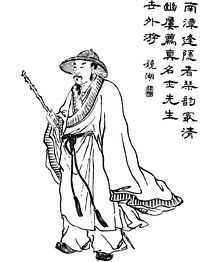Sima Hui
| Sima Hui | |
|---|---|
|
Liu Bei (middle) visits Sima Hui (far right), illustration in the Long Corridor of the Old Summer Palace, Beijing | |
| Born | (Unknown) |
| Died | (Unknown) |
| Names | |
| Traditional Chinese | 司馬徽 |
| Simplified Chinese | 司马徽 |
| Pinyin | Sīmǎ Huī |
| Wade–Giles | Szu-ma Hui |
| Courtesy name | Decao (德操) |
| Other names | Shuijing (水鏡) |

Sima Hui (birth and death dates unknown), courtesy name Decao (德操) and pseudonym Shuijing (水鏡; lit. "Water Mirror"), was a hermit who lived in the late Eastern Han Dynasty. He was from Yingchuan (present-day Yuzhou City, Henan) and lived in northern Jing Province (covering present-day Hubei and Hunan). When he met the warlord Liu Bei, he recommended Zhuge Liang and Pang Tong to be Liu's advisors.
Haohao Xiansheng
Sima Hui was known to never mention others' shortcomings or flaws. His reply to both good and bad news would always be "hao" (好; lit. "good" or "yes"). When someone asked him, "How are you?", he replied, "Good." When somebody told him that their son had died, he said, "Very good." His wife chided him for that, saying, "Everyone sees you as a person of good moral conduct so they are willing to share their problems with you. Why do you say 'very good' when someone tells you that his son had died?" Sima Hui replied, "It's also good to hear what you've just said." This gave rise to the Chinese idiom haohao xiansheng (好好先生; lit. "Mr. Yes" or "Mr. Good").
In fiction
In chapter 37 of Luo Guanzhong's historical novel Romance of the Three Kingdoms, Sima is described to be a carefree, wandering man who is well-versed in many arts. He has a close relationship with Pang Tong, and refers to Pang as a younger brother.
Sima is also featured in Chan Mou's manhua The Ravages of Time as the teacher of the "Eight Enigmas", a group of elite strategists and advisors.